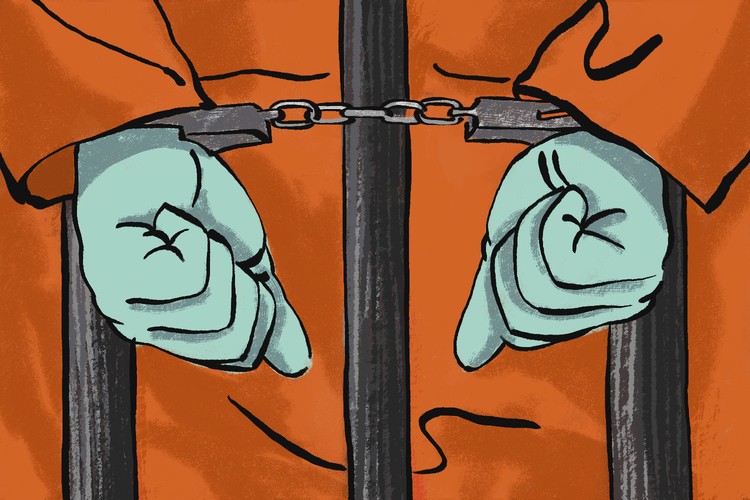MPs call for action on prison overcrowding
Portfolio committee suggests alternatives to reduce remand detention
Chair of the Portfolio Committee on Correctional Services Kgomotso Ramolobeng says urgent action is needed to address the state of South Africa’s prisons. Illustration: Lisa Nelson
-
Parliament’s Portfolio Committee on Correctional Services says overcrowding in prisons is largely caused by problems with the justice system, with nearly a third of inmates still awaiting trial.
- Thousands of people are behind bars simply because they can’t afford bail, often set at amounts below R1,000.
- The committee also raised concerns about poor prison infrastructure and the high number of people from other countries in South Africa’s prisons.
Parliament’s Portfolio Committee on Correctional Services is calling for urgent action on the biggest problems facing South Africa’s prisons.
During a media briefing on Monday, committee chair Kgomotso Ramolobeng said that the large number of remand detainees – prisoners awaiting trial – was the biggest contributor to overcrowding. There are currently around 57,600 remand detainees. Almost a third of people in South African prisons are awaiting sentencing.
Ramolobeng said both the departments of Correctional Services and of Justice and Constitutional Development must take responsibility. In the 2023/24 financial year, only around 3% of the cases referred to courts were successfully prosecuted. This is a “tiny success rate,” she said.
Legislation that is supposed to regulate remand detention is “producing very minimal results”. This includes Section 63A of the Criminal Procedure Act, which allows for people to be released on warning instead of bail, and Section 49G of the Correctional Services Act, which limits remand detention to two years.
Ramolobeng said the committee has invited the justice minister to address the committee on how to better process remand detainees.
About 2,500 people are in prison simply because they can’t afford bail. These inmates frequently have bail set between R300 and R1,000.
It costs the state around R470 a day to keep them in prison, said Ramolobeng.
“We cannot have a system that further perpetuates the injustices that our constitutional democracy so desperately tries to correct,” said Ramolobeng.
Community service instead of imprisonment could be more appropriate in some cases and will reduce overcrowding.
Infrastructure
Ramolobeng also highlighted the infrastructure backlog. There is not enough maintenance, and infrastructure is often vandalised by inmates, she said. Overcrowding puts a strain on infrastructure.
While some facilities need regular maintenance, others require major upgrades and repairs. For example, a kitchen in a Durban prison is temporarily closed for repairs after concerns were raised by the parliamentary portfolio committee, said Ramolobeng. The department also closed and repaired the kitchen at Modderbee prison in Gauteng earlier this year.
The department remains underfunded, she said. This year, the department has been allocated R29.2-billion.
“The committee has urged the department to tighten its belt and implement measures to cap expenditure, including placing more emphasis on a self-sufficient and sustainability model and using offender labour to cut costs,” said Ramolobeng.
“Foreign nationals”
Ramolobeng also addressed the issue of immigrants in South African prisons - a topic raised in several committee meetings in recent months.
There are more than 25,500 people of other nationalities in South African prisons as of 30 June. Around 13,400 of them are sentenced offenders, while the rest are remand detainees awaiting sentencing.
Ramolobeng said that this costs the country around R11-million a day (GroundUp has not independently verified this).
“The committee is seriously concerned that our correctional facilities have so many foreign nationals, but our country has not entered into an inmate exchange program with other countries, to see how we mitigate this challenge.”
She suggested that those sentenced to life could serve these terms in their home countries. She said the Department of Correctional Services has taken this issue seriously and indicated that it is open to revising the relevant section in the Correctional Services Act.
Support independent journalism
Donate using Payfast

Don't miss out on the latest news
We respect your privacy, and promise we won't spam you.
Next: Gauteng government scrambles to meet drug rehab targets
Previous: Minister appoints ten new lottery grant assessors after year-long delay
© 2025 GroundUp. This article is licensed under a Creative Commons Attribution-NoDerivatives 4.0 International License.
You may republish this article, so long as you credit the authors and GroundUp, and do not change the text. Please include a link back to the original article.
We put an invisible pixel in the article so that we can count traffic to republishers. All analytics tools are solely on our servers. We do not give our logs to any third party. Logs are deleted after two weeks. We do not use any IP address identifying information except to count regional traffic. We are solely interested in counting hits, not tracking users. If you republish, please do not delete the invisible pixel.

